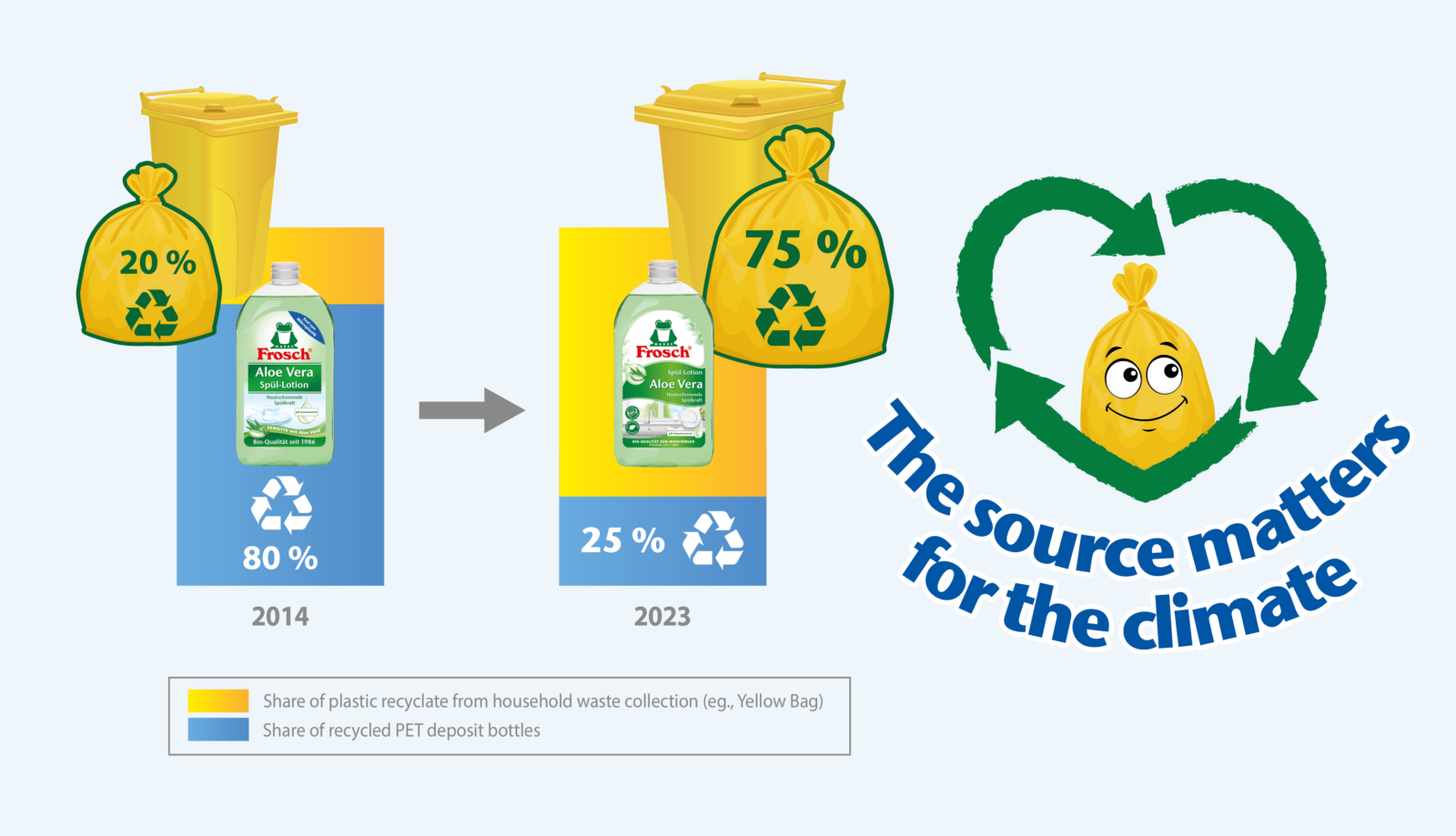Share from Yellow Bag increased to 75 percent
The source matters for the climate – Frosch reaches new milestone
Werner & Mertz, a family-run company with sites in Mainz and Hallein, is known as an established, innovative market leader in cleaning and care products and laundry detergents. With its partner ALPLA, Werner & Mertz is committed to an environmentally friendly circular economy. Within the scope of the Recyclate Initiative, the two companies have achieved yet another success for the circular economy. For the proven Frosch PET bottles of 100 percent recycled plastic, they have raised the share of rPET from the Yellow Bag to 75 percent.
In 2012 Werner & Mertz, ALPLA and other cooperation partners along the value chain jointly launched the Recyclate Initiative. They have good reason to celebrate their success in increasing the share of rPET in Frosch PET bottles made of 100 percent recycled plastic. “As a pioneer, Werner & Mertz drives the technological exploitation of material from the Yellow Bag for high-quality packaging. More than 15 million PET bottles with the increased share of 75 percent Yellow Bag material have been placed in the market, once again proving the feasibility of our approach. We put used plastic from post-consumer waste collections through high-quality mechanical reprocessing, re-use it and thus keep it in a closed loop,” said Alexander Schau, Head of Packaging Development at Werner & Mertz. The remaining 25 percent of the material, which also is mechanically recycled, from the European deposit bottle collection (Bottle to Bottle).

Technological progress and expertise give rise to innovation
Thanks to the familiar high quality and unaltered look of the bottle, consumers do not see a difference. The step up to 75 percent was made possible by a state-of-the-art sorting facility and knowledge acquired from continuous monitoring of the delivered PET bales in the recycling plant.
Continuous development and investment
ALPLArecycling was able to increase sorting efficiency with ultra modern software and computer technology which allow more precise sorting at higher speed. “Plastic is valuable material that should get the best possible re-use in a closed loop. We manage to do that by continuously developing our recycling processes and investing in the latest sorting technology. Our many years of cooperating with Werner & Mertz on increasing the proportion of recycled material from the Yellow Bag is a great example of joint implementation of progressive recycling projects,” said Dietmar Marin, Managing Director Recycling Division at ALPLA. Packaging experts from Werner & Mertz examine the bales of used plastic delivered to the recycling plant. At regular intervals on site, they analyze the materials and their quality in PET bales awaiting recycling. Knowledge of this particular waste stream goes into process development.
The source matters for the climate
“Used plastic from the Yellow Bag can now be sorted by type and cleaned in a high-quality upcycling process. Given its low melting point, plastic is suitable for new uses over and over. So in our industry, the mechanical recycling of plastic is the most direct and most energy- efficient form of a circular economy,” said Florian Iro, Managing Director of Erdal GmbH at Werner & Mertz Hallein.
Concern has been voiced, however, over the manufacturing of virgin plastic. In a 2022 study by the ETH Zürich, researchers found “twice as much fossil carbon is combusted as fuel for plastics production than contained as feedstock in plastics.” The many variations of pyrolysis—also known as “chemcycling” or “chemical recycling”—have one thing in common. They require a lot of energy to obtain plastic from pyrolysis oil. A study by a major environmental organization documents the poor track record of this process. To convert one metric ton of used plastic into plastic, pyrolysis needs one metric ton of fossil fuel as an additional energy supplier. Independent experts therefore see pyrolysis not as a variety of recycling, but rather as a variant of incinceration.
Consequently, Werner & Mertz will continue its successful cooperation with ALPLArecycling and put its stake on the most direct and energy-efficient form of the circular economy in the industry, that is, the mechanical recycling of plastic.



